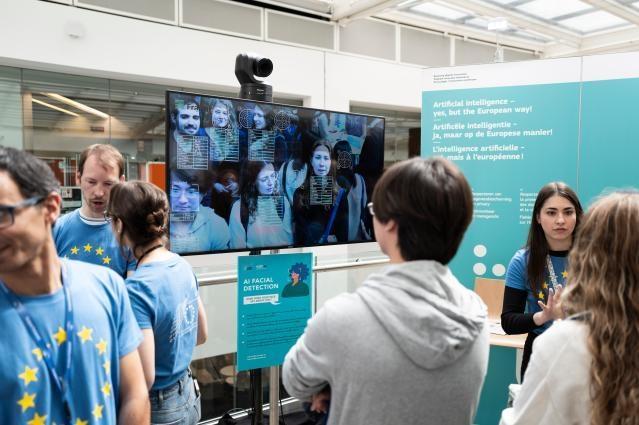Why Europe Must Invest Heavily in Its Own Artificial Intelligence Program
To remain secure and independent in an AI-driven world, Europe must invest heavily in developing its own AI infrastructure. Without decisive action, Europe risks falling behind the U.S. and China in both economic and military spheres.

In an era of rapidly increasing power and influence of artificial intelligence (AI), Europe finds itself sitting in the backseat of its symbolic "Volkswagen." The United States and China are accelerating ahead, much like they have in other critical strategic initiatives such as space exploration. Europe, as a collective, risks missing the boat again unless it takes decisive, bold, and perhaps unpopular action. Falling behind in AI, a field soon to be central to global security and defense, would damage not only Europe’s economy but, more importantly, the well-being of its citizens.
There is an urgent need to pool European resources for a focused and substantial leap in artificial intelligence. This is no longer a mere option for Europe—it is a necessity.
Put aside the hype around AI used for artistic image generation or homework bots. Focus instead on the continuous progress made by companies and teams working on improving the algorithmic efficiency of their models and scaling up computing power. To provide some context: training GPT-4 took three months. By 2026 or 2027, training a GPT-4 equivalent will take a day or less. The progress AI will make within this decade will make the last 35 years of the internet's evolution look trivial by comparison. This text takes a pessimistic view, as current European Union (EU) efforts in AI are primarily regulatory rather than innovative or forward-looking.
The world is heading toward a future far beyond the current state of AI, with its basic Input/Output bots like ChatGPT, Midjourney, Mistral, and Gemini. OpenAI is expected to launch its "Strawberry" project in autumn 2024, marking a first step toward an actual thinking AI model, potentially solving mathematical problems with up to twice the accuracy of GPT-4.
Research and technology in the U.S. and China are advancing toward artificial general intelligence (AGI)—machines that can think and reason—within this decade. These machines could outthink top graduates from institutions like Oxford, the Max Planck Institute, and the University of Vienna.
Imagine these brilliant minds, multiplied by the millions through AGI, working tirelessly in the background. Now imagine these AGI systems controlled by an anti-democratic or anti-European government. The implications for European security would be catastrophic. Scaling such intelligence for benevolent purposes, such as curing diseases or addressing climate change, is the only hope for saving humanity from the damage it has caused over the last century. AGI could be the solution, but it could also be a tool for harm.
The Race Is On, and Europe Is Lagging
Estimates suggest that U.S. investments in compute clusters filled with Nvidia GPUs will reach a staggering $1 trillion within this decade. Meanwhile, European politicians need to take note—and, more importantly, act—to ensure the stability and security of Europe’s 400 million citizens. The €4 billion invested into the European Space Agency’s delayed Ariane program pales in comparison to the U.S.'s efforts to build a $100 billion compute cluster within the next few years, not to mention the significant investments made to secure the energy resources required to power these clusters.
In the consensus-driven EU, replicating the scale of U.S. investment will require immense political will. But these discussions need to begin now, and they must lead to clear commitments. Failing to invest in AGI development leaves Europe vulnerable to attack from other countries, which could use AI to destabilize the Union further.
Countries won’t wait to leverage their technological advantages. The first wave of destabilization won’t come from troops on the streets or bombs dropped on schools, but from the subtle infiltration of Europe’s political and democratic systems. These attacks will use AI to undermine Europe's institutions and infrastructure, with the aim of slowly, silently destabilizing the continent.
The idea that AI won't be used for destabilizing actions by anti-democratic forces must be dismissed. Simple AI tools are already being used by groups in Russia, China, Iran, and even certain U.S. factions to manipulate millions of Europeans, spreading false information to destabilize societies. This is happening now, in real-time, as you read this.
The principle behind these efforts is simple: false information fuels instability. Unlike the propaganda of old—flyers dropped from planes or crackling radio shows—modern AI-powered disinformation spreads through digital platforms like TikTok, Facebook, and YouTube, reaching millions of Europeans in the blink of an eye.
AI has already transformed disinformation campaigns, automating what was once labor-intensive work. Deepfakes, generative language models, and conversational AI bots are undermining society’s ability to distinguish fact from fiction, creating a lasting trust deficit.
Imagine the power of AGI, running disinformation campaigns smarter than Europe’s brightest minds, spreading lies about politicians and institutions in real-time across every available channel until confusion leads to chaos. This would cause irreparable damage to Europe’s democratic principles, making the continent's institutions powerless in the face of this onslaught.
Building the CERN of AI to Bring AGI to Europe
The United States, recognizing AGI’s transformative potential in military and economic spheres, will likely launch a government-led AGI project within the next few years. Europe, by contrast, has yet to fully wake up to this reality. Without a unified effort, Europe risks being outpaced and outmaneuvered on the global stage.
Europe must invest in securing GPU supplies, the infrastructure to run large-scale compute clusters, and the talent needed to build these systems. The continent is home to world-class researchers, but basic research alone will not secure Europe’s future in AI.
Europe has successfully launched large-scale initiatives in the past, such as the Quantum Flagship Initiative in 2018. But its €1 billion annual investment in AI largely focuses on regulation, not innovation. These scattered efforts are insufficient to make Europe a global AI powerhouse.
To avoid falling further behind, Europe must ramp up its investments in AGI development by a factor of 100 and consolidate them into a single, coherent strategy. The security and stability of 400 million Europeans depend on it.
The Stakes of AGI for European Security and Defense
Superintelligence—AI systems far surpassing human intelligence—will soon become a decisive factor in global power dynamics. From developing novel weaponry to revolutionizing defense strategies, superintelligence will be at the heart of military competition.
Europe cannot afford to rely on foreign powers for such critical technology. Its security and defense must rest on its own AI developments to protect European values and interests.
If Europe fails to develop a central AI strategy, it risks becoming dependent on external actors—particularly the U.S.—for security. This dependency could undermine Europe’s autonomy and leave it vulnerable, especially if relations with the U.S. sour. Moreover, authoritarian states aggressively pursuing AI dominance would hold a significant advantage over a Europe without its own AGI capabilities.
AI's Role in Future Conflicts
The future of warfare will be shaped by AI, from autonomous drones to cyber defense systems. The ability to develop and control these technologies will determine global power in the 21st century. If Europe does not secure its place in AI, it will be left vulnerable to those who do.
AI misuse also poses significant risks. Europe must lead in setting safety standards and regulations for AI to prevent its proliferation in warfare and to ensure responsible use. A European AI institute could advance technology while positioning Europe as a leader in global AI ethics and governance.
Ensuring European Leadership in AI
Europe must establish a dedicated AI strategy, bringing together its top minds in technology, defense, and policy. This institute should drive AI research, develop military applications, and ensure European leadership in AI innovation. Close cooperation with NATO and other international allies will be crucial to Europe’s success.
Further Reads
EU AI Regulation and Strategy: The European Artificial Intelligence Act (AI Act), which came into force in 2024, provides a comprehensive regulatory framework that aims to ensure safe and trustworthy AI development while addressing its potential risks. The EU’s approach focuses on regulating high-risk AI systems such as those used in healthcare and recruitment while outright banning dangerous applications like social scoring. However, the act prioritizes regulation over innovation, highlighting the EU’s current focus on safeguarding citizens' rights over advancing cutting-edge AI technology.


AI Investments in the U.S. vs. EU: While the U.S. is making significant strides in AI investments, with projections of reaching up to $1 trillion in compute infrastructure within the next decade, Europe lags behind with smaller, fragmented investments. The European Commission has committed €1 billion per year for AI, primarily directed toward regulatory efforts rather than fostering technological innovation.

Global Competition in AI and AGI: The competition to develop artificial general intelligence (AGI) is intensifying, with countries like the U.S. and China leading the race. This highlights the need for Europe to accelerate its own AI strategy to remain competitive and secure. The EU’s Quantum Flagship Initiative and the broader regulatory framework reflect Europe's potential to lead in basic research, yet without more significant financial and political backing, the continent risks falling behind.








